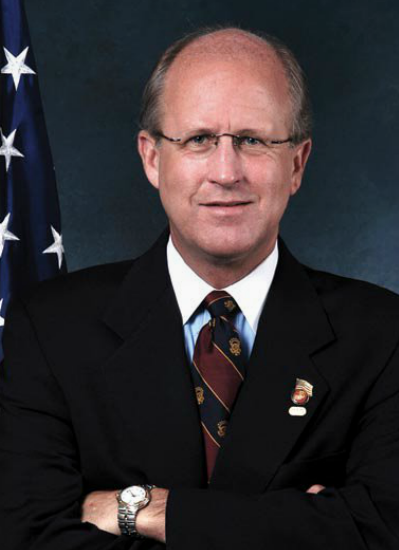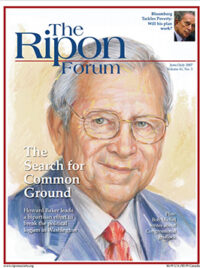
I’m sure I don’t need to tell any of you that the world has changed significantly in the past 20 years. But the truth is, we’re going to see even greater changes in the next 20 or 30 years. To avoid irrelevancy, businesses, nonprofit entities, and federal agencies will all need to adapt to this accelerating pace of change. Stated differently, we can’t just be concerned with today, we need to focus on the future.
To capitalize on our opportunities and minimize related risks, all organizations must be mindful of the big picture and the long view. Organizations that endure tend to periodically rethink their missions and operations. World-class organizations understand that innovation requires change. One must change in order to continuously improve. The simple truth is an organization that stands still today is going to get passed by and, ultimately, it may not survive.
It’s useful to remember at the end of the 19th century, the original Dow Jones Industrial Average consisted of 12 stocks. These were all powerful companies, the leaders in their fields. Names like National Lead, U.S. Rubber, and Tennessee Coal and Iron were the Microsofts and Wal-Marts of their day. It’s sobering to realize only one of the original 12 Dow Jones companies survives today, and that’s GE. The rest couldn’t adapt to changing conditions and either merged with competitors or went out of business.

Efficient and effective government matters. Hurricanes Katrina and Rita brought that point home in a painful way.
Unfortunately, once federal programs or agencies are created, the tendency is to fund them in perpetuity. As President Ronald Reagan once quipped, a government program is “the nearest thing to eternal life we’ll ever see on this earth.” This is a key reason our government has grown so large and so expensive.
American families regularly clean out their closets and attics. Surplus items are either sold at yard sales or given to charity. Unfortunately, when it comes to federal programs and policies, our government has never undertaken an equivalent spring cleaning.
We need nothing less than a top-to-bottom review of federal programs, policies, and operations. Congress and the President need to decide which of these activities remain priorities, which should be overhauled, and which have simply outlived their usefulness.
Entitlement reform is especially urgent. Unless we reform Social Security, Medicare, and Medicaid, these programs will eventually crowd out all other federal spending. Otherwise, by 2040 our government could be doing little more than sending out Social Security checks and paying interest on our massive national debt.
GAO has been doing its best to bring attention to the problem. To get policy makers thinking, we published an unprecedented report that asks more than 200 probing questions about mandatory and discretionary spending, federal regulations, tax policy, and agency operations. The report is called “21st Century Challenges: Reexamining the Base of the Federal Government,” and is available free on GAO’s Web site at www.GAO.gov.
We need nothing less than a top-to-bottom review of federal programs, policies, and operations.
Last November, I sent a letter to congressional leaders suggesting 36 areas for closer oversight. We also recently updated GAO’s list of government areas at high risk of waste, fraud, abuse, and mismanagement.
Our hope is that policy makers and the public will think more strategically about where we are, where we’re headed, and what we need to do to get on a more prudent and sustainable path. Fortunately, concern seems to be growing. Members of Congress on both sides of the aisle have started asking some pointed questions about where we are and where we’re headed. Even the Administration now acknowledges that deficits matter. In recent statements, the President has pledged not just to balance the budget but also to start tackling our large and growing entitlement promises.
The American people need to become more informed and involved when it comes to the problems facing our country. They also need to become more vocal in demanding change. Younger Americans like you need to speak up because you and your children will ultimately pay the price and bear the burden if today’s leaders fail to act.
The good news is younger Americans turned out in large numbers for November’s midterm election. From Iraq to immigration, from ethical lapses to fiscal irresponsibility, the public’s dissatisfaction with the status quo was abundantly clear. But looking toward 2008, it’s essential that the public and the press hold candidates of both parties accountable for their position on our large and growing fiscal challenge.
Transforming government won’t happen overnight. Success depends on sustained leadership that transcends the efforts of a single person or a single administration. Public officials will also need to partner with other federal agencies, businesses, universities, and nonprofit groups, both domestically and internationally. The bottom line: we can succeed with enlightened and sustained leadership. And unlike with global warming, we can solve our fiscal challenge on our own!
A Call to Public Service
Government transformation isn’t possible without a first-rate federal workforce. In my view, whatever your career, everyone should consider giving at least a couple of years to public service.
Public service can take several forms: military or civilian government service, faith-based or other charitable organizations, or in community and other public interest groups. Lots of jobs in various sectors, from nursing to teaching to social work, also provide wonderful opportunities to serve others.
One person clearly can make a difference in today’s world. My favorite 20th century president, Theodore Roosevelt, is proof of that. TR, as he’s often called, was someone with character, conscience, and conviction.
As our 26th and youngest president, he was an optimist who firmly believed in the potential of government to improve the life of every citizen. As a trustbuster, TR took on some of the nation’s more powerful and ethically challenged corporate interests. And he won. As an environmentalist, TR left us with a legacy of great national parks like Yosemite. As an internationalist, he led peace talks to end the Russo-Japanese War. In fact, TR is the only American to have won both the Congressional Medal of Honor and the Nobel Peace Prize.
Government transformation isn’t possible without a first0rate federal workforce.
TR firmly believed that it was every American’s responsibility to be active in our civic life, and so do I. Democracy is hard work but it’s work worth doing. How America looks in the future is largely up to us. “We the people” are ultimately responsible for what does or does not happen in Washington.
Other countries with similar challenges have already acted. The two best examples are Australia and New Zealand. Like the United States, they have aging populations. Unlike the United States, these two countries have stepped up to the plate and dealt with some of their serious long-term challenges. Among other steps, they’ve reformed their overburdened public pension and health care systems. The efforts by policy makers in Australia and New Zealand show it’s politically possible to make difficult decisions that require short-term pain in the interest of long-term gain.
What’s needed now is leadership — the kind that leads to meaningful and lasting change —has to be bipartisan and broad-based. Leadership can’t just come from Capitol Hill or the White House. Leadership also needs to come from Main Street.
It’s time for the three most powerful words in our Constitution — “We the people” — to come alive. The American people are going to have to become better informed and involved as we head toward the 2008 elections. And the next President, whoever he or she may be, and whichever party he or she represents, should be prepared to use the bully pulpit of the Oval Office to push needed reforms. If these things happen, we have a real chance to turn things around and better position ourselves for the future.
By facing the facts and making sound policy choices, I’m confident we can fulfill our stewardship responsibilities to your generation and to future generation of Americans. As TR said, “fighting for the right [cause] is the noblest sport the world affords.” I would encourage each of you to pick your cause, and do your best to make a real and lasting difference.
David Walker is the Comptroller General of the United States and head of the Government Accountability Office. This article is drawn from a speech he delivered at the New School in New York City on April 25, 2007. The complete text is available at www.GAO.gov.




